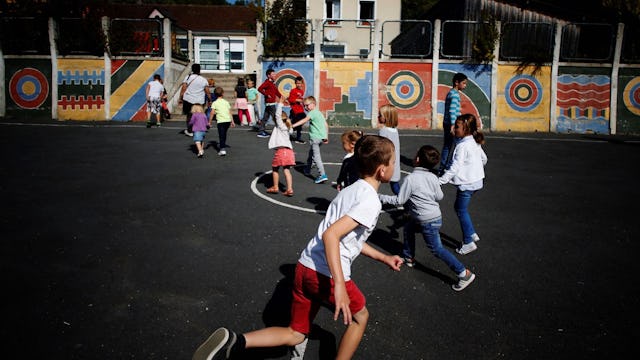More States Are Passing Bills To Make Recess In Schools Longer -- Because It Works

Some schools don’t have recess or give minimal time for free play
If your kids are anything like mine, their favorite part of the school day is lunch and recess. For many kids, however, recess isn’t nearly long enough. One state legislator is looking to change that by passing a bill requiring Connecticut schools to provide at least 50 minutes of recess for elementary students.
Lucy Dathan moved to Connecticut from California and immediately noticed a difference in her kids who came from a school with much longer breaks, the New York Times reported. Their new school only offered 20 minutes of unstructured play, which is not uncommon. I asked my first grader, which is frankly not something I’d ever asked him before and his answer shocked me — 15 minutes a day.
“I haven’t had one person ask, ‘Why are you doing this?’” she said of parents, students, and teachers who have contacted her. “I think playtime fosters the creativity that we need to solve crazy world problems, like global warming, or other issues we need to face as a planet.”
It’s true. Not only do young kids need a break to play, exercise, and mentally unwind during the day, there have been many studies about the importance of recess on child’s ability to concentrate, form relationships, and exercise.
The American Academy of Pediatrics (AAP) recommends that children participate in 60 minutes of “moderate to vigorous activity per day,” and believe recess should be a part of it. “Recess is a necessary break in the day for optimizing a child’s social, emotional, physical, and cognitive development,” they said. “In essence, recess should be considered a child’s personal time, and it should not be withheld for academic or punitive reasons.”
A 2009 study found also that eight and nine-year-old children who had at least one daily recess period of more than 15 minutes had better classroom behavior which backs an emerging body of thought about creativity and childhood. “Creativity in children involves the ability to make things up and generate ideas on their own,” Sandra Russ, a professor in the department of psychological sciences at Case Western Reserve University in Cleveland told The New York Times.
Dathan is not alone. States like also Arizona passed a law that requires two daily recesses for elementary school students. Florida passed a similar bill after parents complained when recess shrank to just ten minutes twice a week. Texas passed a bill giving kids four recess-like breaks a day. and many other states are following suit. Teachers in Arizona are already seen positive results, including “fewer disciplinary actions, enhanced test scores, and improvement in children’s overall health.”
Recess is a way for children to have unstructured time, giving their imagination and creativity time to come alive. This is a time they can form friendships, blow off some steam, and get some much-needed energy expended during the day. Young kids can’t and shouldn’t be expected to sit still all day long in a classroom setting. Here’s hoping more states follow is Dathan’s footprints.